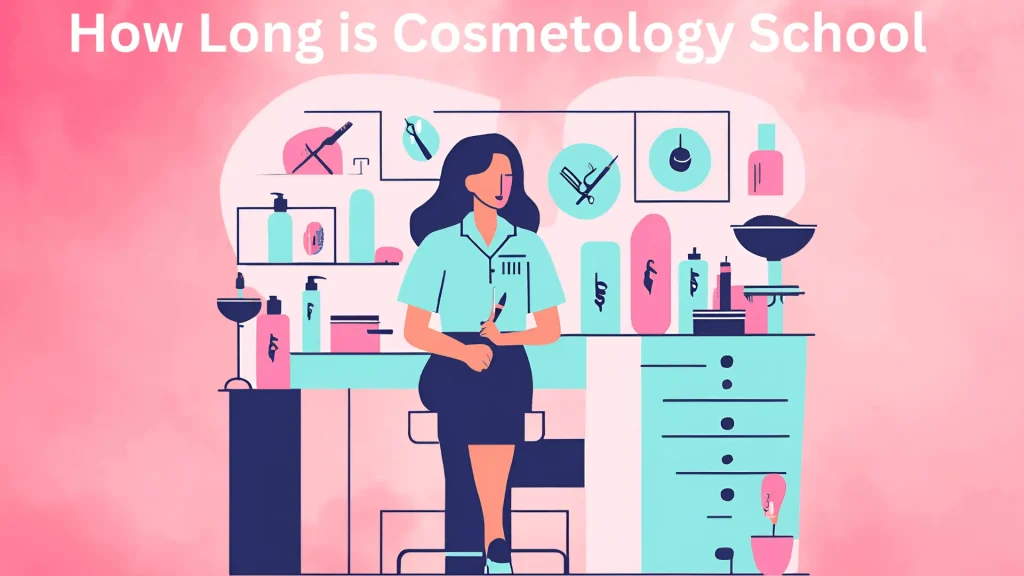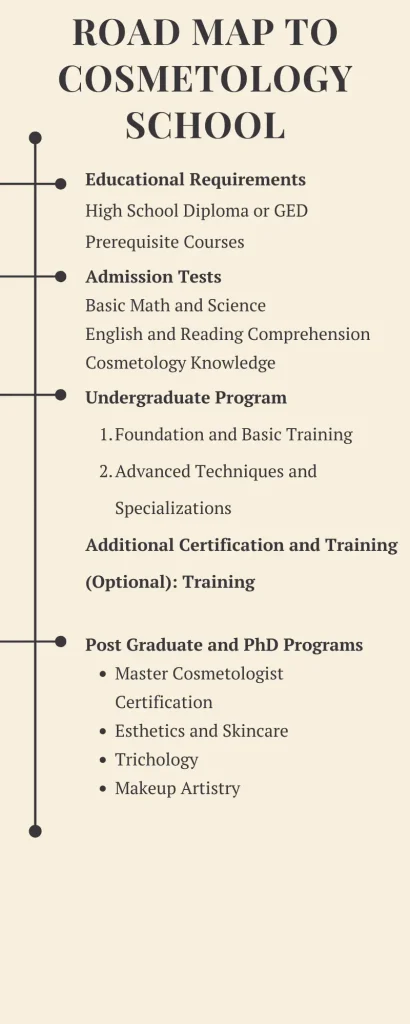How Long is Cosmetology School?
If you’re considering a career in beauty and personal care, you might be wondering, “How long is cosmetology school?” This question is essential as it helps you plan your educational journey and set realistic career goals. In this article, we’ll explore the duration and structure of cosmetology programs, providing a comprehensive guide for aspiring cosmetologists.
What is Cosmetology School?
Cosmetology school is a specialized educational institution where students learn the art and science of beauty treatments. These programs cover a wide range of services, including hair styling, cutting, coloring, skincare, makeup, and nail care.

The curriculum is designed to provide both theoretical knowledge and practical skills. Students gain hands-on experience through supervised practice sessions, allowing them to master various techniques and treatments. Graduates of cosmetology schools are equipped to work in salons, spas, and other beauty-related businesses.
How Long is Cosmetology School?
The length of cosmetology school can vary depending on several factors, such as the specific program and the state’s licensing requirements. Here’s a detailed breakdown of the typical timeline:
Undergraduate Program (Cosmetology Certificate or Diploma):
Year 1: Foundation and Basic Training
First Semester: Introduction to cosmetology, sanitation and safety, basic hair care, and fundamental skin and nail care. Courses typically include anatomy, physiology, and basic chemistry as they relate to cosmetology.
Second Semester: Advanced hair techniques, basic makeup application, and continued practice in skin and nail care. This period also includes introductory business skills, such as customer service and salon management.
Year 2: Advanced Techniques and Specializations
Third Semester: Specialized courses in hair coloring, chemical treatments, and advanced skincare. Students begin to focus on areas of personal interest, such as esthetics or nail technology.
Fourth Semester: Preparation for state board exams, advanced styling techniques, and internship or practical experiences in real salon settings. This semester often includes more in-depth business training, preparing students for potential salon ownership or management roles.
Additional Certification and Training (Optional):
Continuing Education: Many states require cosmetologists to participate in continuing education to maintain their licenses. These courses can be completed part-time and vary in length.
Specialized Courses: For those interested in further specialization, additional certifications in areas like advanced esthetics, makeup artistry, or specific hair techniques can extend the training period. These programs can range from a few weeks to several months.
Overall, completing a cosmetology program typically takes around 12-24 months, depending on the specific requirements and whether the student attends full-time or part-time.

How to Enter Cosmetology School
Educational Requirements:
High School Diploma or GED: Most cosmetology schools require applicants to have a high school diploma or equivalent. Some programs offer concurrent enrollment options for high school students.
Age Requirements: Generally, applicants must be at least 16 or 17 years old, depending on the state.
Tests and Applications:
Basic Math and Science:
Math: Expect questions on basic arithmetic, percentages, and ratios, as these are crucial for mixing chemicals and managing salon finances.
Science: Focus on basic biology and chemistry, particularly related to human anatomy and the chemical properties of beauty products.
English and Reading Comprehension:
Reading passages related to cosmetology.
Answering questions to demonstrate understanding and interpretation of the text.
Cosmetology Knowledge:
Basic concepts in hair, skin, and nail care.
Familiarity with common tools and products used in the industry.
Practical Skills Assessment:
Some schools might include a practical component where you demonstrate basic skills, such as cutting hair or performing a manicure.
Application Process
Research Schools: Look for accredited cosmetology schools that offer programs suited to your career goals.
Submit Application: Complete the application form, which may include an essay or personal statement about your interest in cosmetology.
Interview: Some schools may require an interview as part of the admission process.
Financial Aid: Explore financial aid options, including scholarships, grants, and loans, to help fund your education.
Financial Aid and Scholarships:
Financial Aid: Many cosmetology schools offer financial aid options, including grants, loans, and scholarships. Applicants should check with the school’s financial aid office for specific opportunities.
Scholarships: Various organizations and institutions offer scholarships specifically for cosmetology students. Researching and applying for these can help offset the cost of education.
Postgraduate and PhD Programs
While cosmetology primarily focuses on undergraduate training, there are advanced educational opportunities for those looking to deepen their expertise or specialize in specific areas. These options, however, differ significantly from traditional postgraduate and PhD programs found in other fields.
Advanced Certifications and Specializations:
Master Cosmetologist Certification: This advanced certification allows cosmetologists to specialize further in areas like advanced hair coloring, cutting techniques, or skincare. It typically involves additional coursework and practical training.
Esthetics and Skincare: Specializing in esthetics can involve further education in advanced skincare techniques, microdermabrasion, chemical peels, and other spa treatments. These programs can range from a few months to a year.
Trichology: This specialization focuses on the study of hair and scalp disorders. Trichology courses can help cosmetologists offer more advanced hair and scalp treatments.
Makeup Artistry: Advanced makeup artistry programs cover techniques for special effects makeup, theatrical makeup, and advanced bridal makeup. These courses can vary in length from several weeks to several months.
Higher Education:
Associate and Bachelor’s Degrees in Cosmetology: Some institutions offer associate or bachelor’s degrees in cosmetology or related fields such as business management in the beauty industry. These programs typically include advanced cosmetology courses and business training.
Doctoral Programs: While rare, some cosmetologists may pursue doctoral studies in related fields such as dermatology, education, or business to enhance their career opportunities.
Top 10 Cosmetology Schools
Here is a list of the top 10 cosmetology schools in the world, known for their exceptional programs and courses:

Aveda Institute (USA)
Courses: Cosmetology, Esthiology, Massage Therapy, Spa Therapy
Paul Mitchell Schools (USA)
Courses: Cosmetology, Barbering, Skin Academy, Nail Academy
Vidal Sassoon Academy (USA/UK)
Courses: Haircutting, Coloring, Creative Styling
Toni & Guy Hairdressing Academy (USA/UK)
Courses: Hairdressing, Barbering, Cosmetology, Advanced Hairdressing
London School of Beauty & Makeup (UK)
Courses: Beauty Therapy, Makeup Artistry, Nail Technology, Hairdressing
Pivot Point Academy (USA)
Courses: Cosmetology, Barbering, Esthetics, Teacher Training
Empire Beauty Schools (USA)
Courses: Cosmetology, Esthetics, Makeup Artistry, Nail Technology
Bellus Academy (USA)
Courses: Cosmetology, Esthetics, Makeup Artistry, Spa Nails
Marinello Schools of Beauty (USA)
Courses: Cosmetology, Barbering, Esthetics, Massage Therapy
CIDESCO International (Various Locations)
Courses: Beauty Therapy, Spa Therapy, Aromatherapy, Skin Care
Factors Affecting the Length of Cosmetology School
The length of time required to complete cosmetology school can be influenced by various factors:
State Requirements: Licensing requirements vary by state, affecting the number of hours needed.
Program Structure: Full-time vs. part-time enrollment can significantly impact the duration.
Specializations: Additional certifications or specializations can extend training time.
School Schedule: Some schools offer accelerated programs, while others may have longer terms.
Prior Education: Students with prior relevant education or experience may complete the program faster.
Personal Commitments: Work, family, and other personal responsibilities can influence the pace of study.
Final Verdict
The journey through cosmetology school typically takes 1-2 years, depending on various factors such as state requirements, program structure, and personal circumstances. This training provides a solid foundation in beauty and personal care, offering numerous career opportunities in the beauty industry. Advanced certifications and specializations can further enhance career prospects, making cosmetology a versatile and rewarding field.
FAQs
How long does it take to complete cosmetology school?
It typically takes 1-2 years, depending on the program and state requirements.
What are the basic requirements to enroll in cosmetology school?
Most schools require a high school diploma or GED and a minimum age of 16 or 17 years.
Can I specialize in a specific area of cosmetology?
Yes, you can pursue advanced certifications in areas like hair coloring, esthetics, makeup artistry, and more.
Do cosmetology schools offer financial aid?
Many cosmetology schools offer financial aid, including grants, loans, and scholarships.
Is continuing education required for cosmetologists?
Yes, many states require continuing education for license renewal, ensuring that cosmetologists stay updated with industry trends and techniques.
